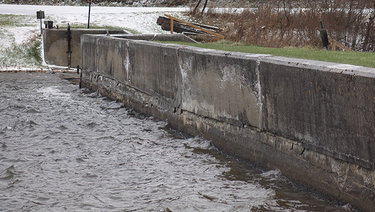Berne Town Board votes ‘no’ on tax district for Helderberg Lake dam repairs
BERNE — In what could very well be the most monumental vote Supervisor Dennis Palow’s administration makes, the Berne Town Board unanimously rejected a proposal from the Helderberg Lake Community Association to establish a tax district that would fund repairs to the high-hazard Helderberg Lake Dam.
High-hazard dams, designated by the state, are those whose failure would result in serious injury to life or property.
The private dam, which is overseen by the HLCA, has been out of state compliance for structural reasons since 2018, inspection reports from the New York State Department of Environmental Conservation show; in earlier years, the dam was out of compliance for administrative reasons.
Because it’s out of line with state regulations, the dam — which is nevertheless not expected to fail imminently, based on its current condition rating — is liable to be removed by the DEC, the department told The Enterprise. This would in turn create an area of wetland where the Helderberg Lake currently exists, HLCA President Tom McQuade said last year.
Removal of the dam would cost $424,000, engineers from Prime AE Group — which had been contracted by the HLCA — told the town board during a presentation last year about the necessity of the tax district.
The engineers estimated that dam repairs, meanwhile, would cost around $445,000. The HLCA was asking $500,000 from the town board,which the residents within the proposed tax district would have repaid over a 30-year period, plus interest.
The DEC could also order that the dam be repaired, which order would be made of the HLCA, which is obviously unable to afford it, at this stage.
The DEC told The Enterprise earlier this year that the “simplest solution” is to “move forward with the currently approved and permitted plans” to repair the dam.
There was strong, vocal opposition from some Helderberg Lake residents during town board meetings that addressed the topic, but the petition submitted by the HLCA in requesting the district was signed by a majority of property owners there.
Some residents were opposed to the tax district because they felt they lived too far away from the lake for its existence to be much benefit for them, and the HLCA ultimately gave those residents who lived off the lake the option to be excluded from the district in exchange for the surrender of their lake rights.
Despite all this, Palow, in reading the resolution, offered the following reasons for the town’s rejection of the HLCA’s proposal:
— It would create a legal liability for the town;
— It would create an environmental liability for the town;
— The district is not necessary because “other viable alternatives exist,” such as removing the dam;
— It would increase the administrative burden on the town;
— It was a public solution for the problem of a private entity; and
— It would raise the town’s insurance costs.
HLCA attorney Dave Brennan told The Enterprise after the vote was taken that he was not surprised by the vote, based on his “read” of the board in the months leading up to it.
Throughout the process, the board had appeared largely sympathetic to the residents who had opposed the district, and offered several unworkable alternatives to the HLCA — for instance, that the residents of the district each take out personal loans, or that the HLCA lower the level of the lake.
Brennan told The Enterprise that the HLCA is now exploring other paths forward, though he would not specify what those were.
“At this point, it’s premature to go into detail, but we’re looking at all available options,” he said.
Helderberg Lake resident Bob Marriott told The Enterprise in a written statement that he was frustrated not just by the board’s decision, but how long it took to arrive at it.
“There was no reason to take such a long time,” Marriott wrote. “They could have come up with their fabricated excuses, such as ‘creating environmental responsibilities that did not previously exist,’ months ago.”
He also wrote, after describing the way in which homes along Onesquethaw Creek might be washed away if the dam were to fail, “Berne had the opportunity to easily do what it could to prevent such a catastrophe, but chose to take the easy way out and do nothing. I am very disappointed.”



